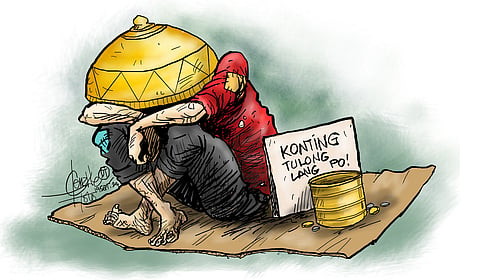
- NEWS
- the EDIT
- COMMENTARY
- BUSINESS
- LIFE
- SHOW
- ACTION
- GLOBAL GOALS
- SNAPS
- DYARYO TIRADA
- MORE

The Philippines, like many developing nations, has long grappled with the complex interplay of poverty, inequality and social welfare. In recent years, the government has significantly ramped up its social amelioration programs, ostensibly to alleviate the hardships of the most vulnerable sectors of society.
Initiatives such as the Ayuda para sa Kapos ang Kita Program (AKAP), Sustainable Livelihood Program (SLP) and Kapit-Bisig Laban sa Kahirapan-Comprehensive and Integrated Delivery of Social Services (KALAHI-CIDSS) have provided financial assistance to hundreds of thousands of Filipinos. While these programs are well-intentioned, the increasing reliance on them raises a difficult question: Is the Philippines unwittingly fostering a culture of dependency that could have detrimental long-term consequences?
On the surface, these social amelioration programs serve an important purpose. They provide a safety net for the poorest Filipinos, particularly during times of crisis such as the Covid-19 pandemic. The AKAP program, for instance, aims to supplement the meager incomes of underprivileged families, while the SLP and KALAHI-CIDSS focus on creating sustainable livelihood opportunities and community-driven development initiatives.
With nearly 300,000 beneficiaries across the country, these programs clearly play a vital role in addressing immediate financial needs.
However, while such programs are necessary for emergency relief, the concern is whether they are inadvertently fostering a mindset of entitlement and complacency. One can argue that consistently offering financial aid without a corresponding emphasis on self-sufficiency risks creating a nation of mendicants — individuals who become reliant on government handouts rather than seeking long-term solutions to uplift themselves from poverty.
The issue of dependency is not a new one. Historically, countries that have relied heavily on social welfare have grappled with balancing assistance with self-reliance. If the populace becomes accustomed to government aid, there may be less incentive to engage in productive work, innovate, or contribute to economic growth. When financial assistance becomes a regular expectation rather than a temporary stopgap measure, the unintended consequence could be a workforce that is less motivated to seek employment or entrepreneurial opportunities.
In the Philippine context, this risk is compounded by political realities. Social amelioration programs often become tools for political patronage, with politicians using them to garner support from voters in exchange for continued aid. This dynamic creates a vicious cycle, where citizens vote for politicians not based on governance or policy, but on who can promise the most financial assistance. The result is a short-term mentality, where economic advancement is viewed not as something to be earned but as something to be distributed.
That said, the problem lies not in the existence of these programs but in how they are implemented and perceived. Social amelioration is not inherently bad; in fact, it can be a powerful tool for social upliftment when paired with opportunities for self-reliance. Programs like the SLP, which aim to develop entrepreneurial capacities and sustainable livelihoods, represent a step in the right direction.
However, the challenge is in ensuring that these initiatives genuinely lead to long-term economic independence for their beneficiaries rather than perpetuating reliance on government aid.
A key reform would be to reframe social amelioration programs as temporary solutions rather than permanent fixtures of governance. Emphasis should be placed on equipping beneficiaries with the skills, education and resources needed to eventually stand on their own. Furthermore, there should be strict accountability measures in place to ensure that the aid reaches those who genuinely need it, while minimizing opportunities for abuse or political exploitation.
At the heart of the issue is the need for a cultural shift — from one that sees government aid as a lifeline to one that views it as a stepping stone toward self-sufficiency. The government must find a balance between providing immediate relief and fostering long-term growth, ensuring that Filipinos are not only supported in times of need but are also empowered to create their own pathways to prosperity.
Without doubt, social amelioration programs like AKAP, SLP, and KALAHI-CIDSS are essential tools in the fight against poverty in the Philippines. However, if not managed carefully, they run the risk of creating a culture of dependency. The focus must shift from mere financial assistance to enabling Filipinos to become self-reliant, productive members of society.
Only then can the country avoid the trap of becoming a nation of mendicants and instead foster a society where opportunities for growth and development are accessible to all.
